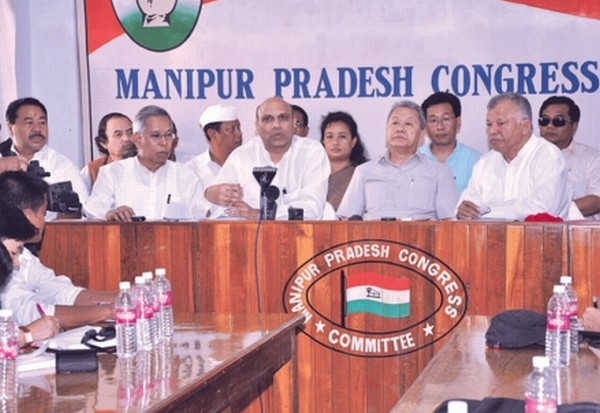Raju sticks to Dec 2013 deadline for NH-37
Slams BJP for misleading public on 'Coalgate'
Source: Hueiyen News Service
Imphal, September 17 2012:
EVEN THOUGH the condition of the National Highway 37 (Imphal-Jiribam Road) continues to remain without any sign of improvement since his last visit, Union Minister of Defense (State) Palam Raju has once again assured the people that repairing of the road would be completed by December 2013 .
Talking to media persons upon his arrival at Congress Bhawan here today, Palam Raju said that the Union Ministry is 'all eyes' over the condition of NH 37 and is targeting to complete the repairing of the said road by December 2013 .
The repairing work along the second lifeline of the state is currently being taken up by BRO.
However, some sections of the people have made known their displeasures over the slow progress and the manner of executing the work by BRO.
The visiting Union Minister informed that construction of Barak Bridge and Makru Bridge along NH 37 is also set to be started in due course of time.
|
The repairing of roads and bridges along NH 37 is being done with funding from the Ministry of Surface Transport Road though the materials for the construction are being acquired locally.
So, the support and cooperation of the local people towards ensuring smooth repairing process is very much essential.
With regard to 'Coalgate', Pallam Raju categorically blamed BJP for alleging misleading the public and making an issue out of allocation of coal blocks and stalling the proceedings of the Parliamentary sessions for 13 days.
It may be noted that Coalgate is a political scandal concerning the Indian government's allocation of the nation's coal deposits to public sector entities (PSEs) and private companies.
In a draft report issued in March 2012, the Comptroller and Auditor General of India (CAG) office accused the Government of India of allocating coal blocks in an inefficient manner during the period 2004-2009.Over the Summer of 2012, the Opposition BJP lodged a complaint resulting in a Central Bureau of Investigation probe into whether the allocation of the coal blocks was in fact influenced by corruption.
The essence of the CAG's argument is that the Government had the authority to allocate coal blocks by a process of competitive bidding, but chose not to As a result both public sector enterprises (PSEs) and private firms paid less than they might have otherwise.
Clarifying over the allegations made by BJP, Palam Raju said that the policy of the allocation of coal blocks to private parties, which the CAG criticised, was not a new policy introduced by the United Progressive of Alliance (UPA).
The policy has existed since 1993 and previous governments also allocated coal blocks in precise manner that the CAG has now criticised.
"In fact, between 1998 and 2004, when the National Democratic Alliance (NDA) was in power, captive coal blocks were allocated to 16 sector companies and 16 blocks to government sector companies without following any transparent procedure," he added.
The Union Minister claimed that the Prime Minister had made improvements in the procedure in 2005 by taking measures such as by inviting application through open advertisements after providing details of the coal blocks on offer along with the guidelines and the conditions of allotment.
These applications also were examined and evaluated by a broad based steering committee with representatives from governments, related Ministers of the Central government and the coal companies.
Every company that has allotted a coal block was required to submit a bank guarantee.
While finalising the amendments in the MMDR Act, the Prime Minister also decided that the bidding amount for the coal blocks would accrue to the states in addition to the royalty which they are already getting.
He, however, added that government has full respect for the CAG, the report on coal block allocation is flawed and Coal Ministry's version has not been asked for by the CAG before finalising its reports, as is the tradition.
The observations of the CAG are disputable.
Pallam Raju then asked as to why not the CAG has audited the period before 2004 when the BJP led NDA was in power.
"It is a known fact that the UPA government has followed the old coal block allocation policy with improvements like the setting up of a screening committee," said the Union minister while adding, "The BJP is stalling the Parliamentary proceedings as it is aware that the government is in possession of letters written to it by the Chief Ministers of BJP and non-Congress States opposing bidding of the coal blocks" .
Accusing the BJP of double-speak as usual, Pallam Raju said instead of demanding the resignation of the Prime Minister, the top leadership of the BJP should resign for misleading the country.
"It is the UPA which brought changes in the system of allocations, not the NDA.
It was the UPA which opted for competitive bidding, not the NDA.
It was the UPA which amended the MMDR Act bringing all states on board and not the NDA," claimed Union Minister.
Luizinho Falero, General Secretary, AICC, North East in charge and Home Minister Gaikhangam were also present at the press conference.








